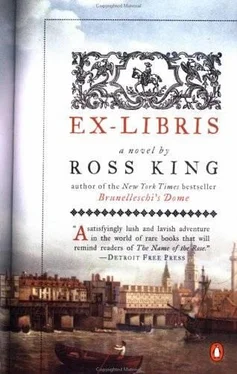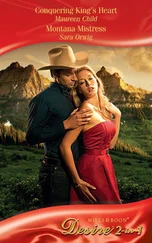The artillery on the mountain had fallen silent, its task complete. Now there was only the rattle of iron shoes on stone and, far in the distance, the odd bark of a musket. When she dared to open her eyes she saw the castle shunting in and out of view beneath a single volute of smoke. Much closer, scrawled on the side of one of the buildings across the street, barely legible, she glimpsed something else, a single hieroglyphic chalked on to the sooty nogging:
The image looked familiar. She had seen it quite recently but couldn't think where. On another wall? Or in a book? She turned her head as they passed it, then quickly ducked as they flew under an arch.
They rode for the next quarter of an hour, back and forth through the streets, bowling north along by-roads parallel to others down which the horse had pelted south a minute earlier. The gutters were frozen, the muck and mud hard with frost. She wondered if they were lost. They seemed to be travelling in circles, doubling back on themselves. She had never crossed the bridge before, never entered the Old Town or the Jewish Quarter, through whose deserted streets they also galloped, passing prayer-schools and synagogues.
At some point on the edge of the Jewish Quarter there came from the street behind them a loud burst of gunfire. The horse reared at the report, then lunged forward into the next street. Emilia, too, started at the sound. Had the Emperor's soldiers breached the gates and reached the Old Town so soon? There was another burst and a wasp buzzed past their heads, striking an alms-box in the wall of a synagogue and rattling its coins. By now she could smell the acrid stink of gunpowder on the wind. As the horse bolted forward she turned her head to see three horsemen in the street behind.
At first she thought they were Cossacks, the fiercest and most brutal warriors in Europe, the subject of dozens of fearful rumours in the palace's sculleries and kitchens. But the trio was not in the dress of Cossacks-the long coats and the tall astrakhan hats. They wore livery instead, cloaks and breeches as black as a Puritan preacher's but trimmed on the sleeves with a gold brocade that glinted as they flew past a rush-lit tavern. She had never seen such garb before, neither in Prague nor Heidelberg. Nor had she seen such hideous faces. Swarthy and bearded, they were twisted like gargoyles' with murderous intent. Gold brocade flashed as one of them raised his pistol. But Sir Ambrose had already pulled his own pistol from his boot and twisted round to return fire. There was a brief hiss before the match smouldered and sparked, then flashed barely six inches from her nose. Another acrid stink. Blinded, she cried out in alarm. Sir Ambrose fumbled for the pistol in his holster, spurring the horse into the next street.
She closed her eyes again, clinging desperately to Sir Ambrose. But there were no more pistol shots. A few minutes and many turns later their pursuers on their faster mounts were somehow shaken loose. When she opened her eyes the foam-flecked horse was clattering into a wide courtyard with a twin-towered church and a clocktower. They had reached the Old Town Square. Dozens of horses and pack-mules were milling about on the cobbles. Men in uniform were shouting instructions in English, German and Bohemian, while others scrambled about like dock workers.
Sir Ambrose drove the horse into their midst, cutting diagonally across the cobbles before reaching a row of arcaded houses with skinny bay windows ablaze with light. There he reined in the winded animal in front of one of the larger houses and swiftly dismounted before handing Emilia down and seizing her elbow. As she landed on the cobbles, his face, grimacing, suffused with shades of carmine and orange, looked less like that of Amadís of Gaul or the Knight of Phoebus and more like those of the black-clad pursuers. Had she been rescued, she wondered, or captured?
The house with its prettily painted façade was a confusion of swooping flambeaux and darting figures. Sir Ambrose led her to the arcade through archipelagos of dung and heaps of baggage that seemed to have been washed against the columns by a forceful tide. Donkeys were braying and flames ruffling through the air. Where was he taking her? She felt like the game-bird caught in the jaws of the retriever. She struggled briefly-her first show of resistance. Then, as they passed by an upheld torch, she saw how he was clutching something in his other hand. The gauntlet had been removed and his fingers were stained with ink. It took her another second to recognise the object as a book, the one from the library: the lone, leather-bound parchment that had been sitting on Vilém's desk. Again she tried to twist free, but then the door swung open and she was swept inside.
II. The Interpreter of Secrets
Nonsuch Books was not in the chaos I expected it to be in when I returned home, exhausted, after the arduous journey from Crampton Magna. As Phineas deposited me on London Bridge I caught a glimpse of Monk through one of the polished windows. He was bent over the counter, and behind his bowed head the books were ranged in soldierly ranks along their shelves, the afternoon sunlight lambent on their bindings. Everything was in its proper place-including, at last, me. My exile had ended.
On disembarking from the coach, I stamped my boots on the tiny cobblestones as if ridding them of the dirt and decay of Pontifex Hall. I paused to wipe my brow and inhale several lungfuls of the acrid breeze from the river. It was nearing six o'clock in the afternoon. Crowds were returning from the markets with their suppers, passing over the bridge and into Southwark. Shins of beef, wrapped in brown paper, and silver-finned fishes with wide, sardonic grins protruded from baskets as wives and servants pushed past me along the footway. I stepped forward and opened the green door with a grateful sigh and a promise to myself-soon violated-never to leave London again.
'Sir! Good afternoon!' Monk leapt from his seat like a singed cat, then helped me scrape the trunk across the threshold. 'How was your journey, Mr. Inchbold? Did you enjoy the country?' He was giving the trunk a peculiar look, I suppose because he expected it to be filled to bursting with books, which he rightly supposed were the only possible inducements to my departure. 'Was the weather fine and dry, sir?'
I patiently answered these questions and a half-dozen excited others. By the time I had finished, the bells of St. Magnus-the-Martyr were striking six o'clock, so I raised the awning, fastened the shutters and locked the door. I performed these operations with a certain reluctance, because I was eager to immerse myself in the waters of beautiful routine; to see my regular customers streaming through my door; to have the familiar sight of their faces and sound of their voices dilute the disturbing memories of the past week. Monk saw me spot my mail in a neat pile on the counter. The letter from Monsieur Grimaud, he explained, had at last arrived from Paris.
'Come, Monk.' I was reading the letter as I climbed the turnpike stair. Vignon's edition of Homer had eluded us after all, but not even this disappointment could dampen my reviving spirits, for by now I had caught a reassuring smell of food and heard the familiar clatter of pots and pans in the scullery. 'Shall we see what Margaret has prepared for our supper?'
But of course I knew that, today being Wednesday, a rabbit from the market in Cheapside would, as usual, be roasting on the spit, next to a boiling pot of sweet potatoes purchased in Covent Garden. And, also as usual, Margaret would have uncorked a bottle of Navarre wine, from which I would allow myself three purple inches as I sat in my upholstered armchair and smoked my two bowls of tobacco.
Читать дальше












